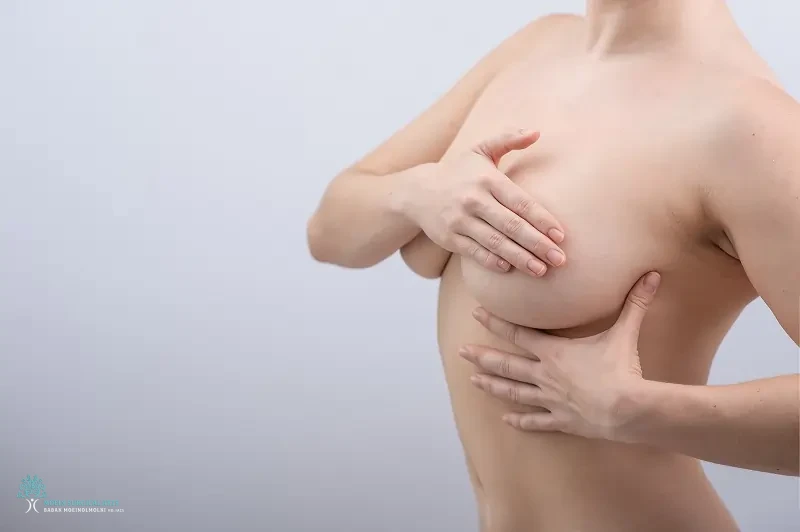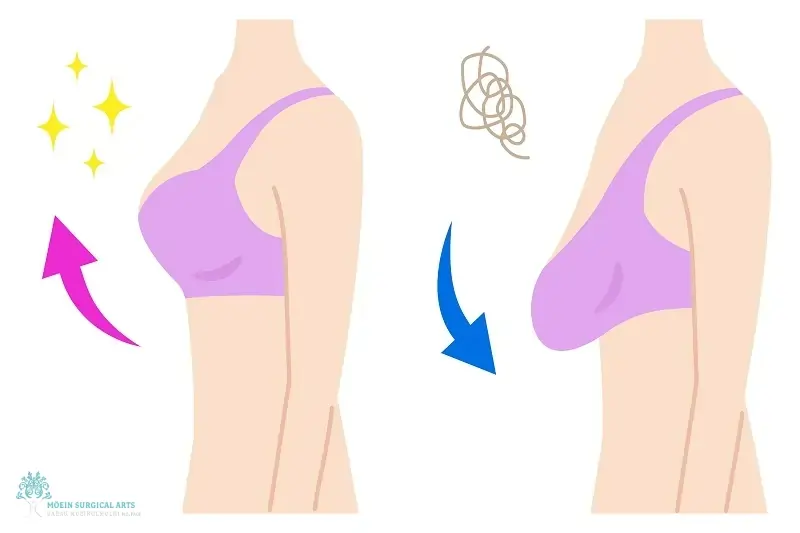Many individuals desire perky breasts, often associated with youthfulness and a more attractive appearance. However, aging, weight fluctuations, pregnancy, and breastfeeding can contribute to sagging or drooping breasts over time. This comprehensive guide on perky boobs will explore various methods to help you achieve firmer and more youthful-looking breasts.
We will discuss non-surgical techniques for maintaining breast firmness through diet and exercise regimens targeting chest muscles while emphasizing the importance of wearing well-fitted bras for support. Additionally, we will delve into cosmetic procedures like breast lift surgery (mastopexy), breast augmentation using implants, and breast reduction surgery.
Lastly, we’ll provide an overview of the costs involved in these procedures, insurance coverage considerations, and financing options available for those seeking surgical intervention to restore perkiness in their breasts.
Non-Surgical Methods for Perkier Breasts

Want to achieve perkier breasts without going under the knife? Here are some non-surgical methods to try:
Eat Your Way to Firmer Breasts
A balanced diet is key to promoting breast firmness. Nutrient-dense foods containing vitamins, minerals, antioxidants, and lean proteins can help sustain skin suppleness and collagen synthesis. Some foods that promote healthy skin include leafy greens, berries, nuts, seeds, and fish rich in omega-3 fatty acids like salmon and mackerel.
Work Those Chest Muscles
Targeting the pectoral muscles through exercise can improve the appearance of sagging breasts; for women looking to target their chest muscles, push-ups, dumbbell bench press, dumbbell flyes, cable crossovers, and seated machine chest presses are all viable options.
- Push-ups: This classic bodyweight exercise targets both major pectoral muscles – pectoralis major & minor – along with other upper body muscles.
- Dumbbell bench press: An effective compound exercise that works the pectoral muscles, triceps, and shoulders.
- Dumbbell flies: This isolation movement targets the chest muscles while minimizing involvement from other muscle groups.
Find the Perfect Bra for Support
A well-fitted bra can make a significant difference in achieving perkier breasts. The right bra supports your breast tissue properly, reducing sagging over time. When shopping for bras, get professionally measured or use an online guide like ThirdLove’s Fit Finder to ensure you wear the correct size and style for your unique shape. Investing in sports bras during workouts will help minimize bouncing and strain on delicate breast tissues.
Breast Lift Surgery (Mastopexy)

Looking for a way to perk up your girls? Breast lift surgery, also known as mastopexy, might be the answer. This procedure involves removing excess skin around the nipple-areola complex and reshaping underlying tissues to give you a firmer, lifted look.
The Surgical Process Involved in Mastopexy
First, anesthesia is administered, and then incisions are made based on your desired outcome and individual anatomy. The surgeon removes excess skin, lifts the breast tissue, and repositions the nipple-areola complex to a higher position. Finally, they close the incisions using sutures or adhesive tape before applying dressings to protect the wound site during recovery.
Recovery Timeline After a Breast Lift Surgery
- First week: Expect some swelling and discomfort, which can be managed with prescribed pain medication. You’ll likely wear a support bra or compression garment to minimize swelling and promote healing.
- Two weeks: Most patients return to work within two weeks but should avoid heavy lifting or strenuous activities until cleared by their surgeon.
- Six weeks: By this time, you should feel comfortable resuming all normal activities, including exercise routines, without any restrictions.
- Six months – one year: Your scars will continue to fade over time; however, final results are typically visible between six months up till one-year post-surgery date, depending upon factors like age, genetics, and overall health status, among other relevant aspects involved.
Potential Risks Associated with This Procedure
Risks associated with mastopexy, such as infection, bleeding, scarring, changes in nipple or breast sensation, and anesthesia-related issues, should be discussed with a cosmetic surgeon before the procedure. Some of these include infection, bleeding, scarring, changes in nipple or breast sensation, and anesthesia-related issues. I’d appreciate it if you talked about these concerns with your cosmetic surgeon during the consultation process, so you can decide whether mastopexy is right for you.
Breast Augmentation Using Implants
Looking to enhance your curves? Breast augmentation using implants is a popular cosmetic procedure that can give you the fuller, more voluptuous look you desire. Not only can it boost your confidence, but it can also improve your overall quality of life.
Types of Implants Available
You have two main options for breast implants: saline-filled and silicone gel-filled. Saline implants are filled with sterile salt water and are less expensive, while silicone implants are filled with a cohesive silicone gel that feels more natural. It’s essential to consult your doctor when considering the advantages and disadvantages of both saline-filled and silicone gel-filled implants.
The Procedure for Breast Augmentation
The breast augmentation procedure involves an incision and inserting the chosen implant into a pocket behind or in front of your chest muscle. The incision may be made in the breast fold, around the nipple, or near the armpit, depending on what your surgeon decides. Your surgeon will then close up the incision site using sutures.
- Inframammary: Incision made under the breast fold.
- Periareolar: Incision made around the nipple area.
- Transaxillary: Incision made near the armpit.
Post-Surgery Care and Maintenance
For a successful post-operative experience, adhere to the instructions provided by your surgeon regarding care and maintenance after transaxillary incision breast augmentation. This may include wearing a supportive bra, taking prescribed medications, and avoiding strenuous activities. Be aware that breast implants may require replacement or removal at some point in the future.
For more information on breast augmentation, check out the American Society of Plastic Surgeons or the Mayo Clinic.
Breast Reduction Surgery
Are your breasts causing you physical discomfort or emotional distress? It might be time to consider breast reduction surgery. This procedure removes excess breast tissue, fat, and skin to achieve a more proportionate size while lifting the breasts into a perkier position.
Benefits of Breast Reduction Surgery
- Improved Comfort: Say goodbye to neck, shoulder, and back pain caused by heavy mammary glands.
- Better Posture: Smaller and lighter breasts allow for better posture and less strain on your chest muscles and connective tissue.
- Increase Confidence: Boost your self-esteem by creating a more balanced appearance.
- Easier Clothing Fit: Finding well-fitted bras or clothing items becomes easier when you have smaller cup sizes to work with after surgery.
Recovery Process After Breast Lift Surgery

Following breast reduction surgery, the recovery process typically involves wearing a supportive bra for several weeks post-operation. You may experience swelling, bruising, or mild discomfort during this time, but you should expect these symptoms to subside gradually. Most patients return to work within one week after their operation but are advised against strenuous activities until fully healed – usually around six weeks later. It’s essential to follow all post-operative care instructions provided by your board-certified plastic surgeon closely for optimal results and minimal complications during healing.
Potential Complications and Long-Term Results
Though risks like infection, scarring, altered nipple or breast sensation, and asymmetry may occur in a breast reduction procedure, an experienced plastic surgeon can significantly reduce the likelihood of complications. Some of these include infection, scarring, changes in nipple or breast sensation, and asymmetry. Yet, when done by a professional plastic surgeon, the probability of difficulties is greatly reduced.
Most patients experience lasting satisfaction with their new breast size and shape. Aging, weight fluctuations, pregnancy, or breastfeeding can still affect your breasts’ appearance over time. However, maintaining a stable weight and practicing good breast health habits will help preserve your perky breasts for years.
Costs Involved in Cosmetic Breast Procedures
Planning to get perky breasts? Don’t forget to consider the costs involved in cosmetic breast procedures. Exploring the numerous possibilities can help you to make a knowledgeable choice.
Factors Affecting Costs of Different Surgeries
Various factors such as geographical location, surgeon experience, and the procedure’s complexity must be considered to determine the cost of breast surgery. Breast augmentation costs could range from four to ten thousand dollars, while a lift might cost between five and fifteen grand. Similarly, breast reduction surgery can also have varying costs based on individual needs.
Insurance Coverage Considerations
Unfortunately, insurance companies do not cover cosmetic breast procedures because they are considered elective surgeries. However, some reconstructive procedures following mastectomy or injury may qualify for partial or full insurance coverage. To determine if your situation qualifies for coverage, consult your plastic surgeon and insurance provider beforehand.
Financing Options for Cosmetic Procedures
If you’re worried about the costs, several financing options are available to help make these procedures more affordable. Some plastic surgeons offer in-house payment plans, allowing patients to pay off their surgery over time with manageable monthly payments. Additionally, medical credit cards like CareCredit can be used specifically for healthcare expenses and often provide promotional interest rates or deferred interest plans.
Remember, restoring perkiness to your breasts is an investment in your health and appearance. Take the time to research different providers and financing options before deciding which procedure is right for you.
FAQs about Perky Breasts

Why aren’t all breasts perky?
Breasts can lose their perkiness due to aging, weight fluctuations, pregnancy, breastfeeding, and genetics, which affect the elasticity of breast tissue and ligaments, causing them to sag over time.
How can I lift my breasts naturally?
To achieve a natural breast lift without surgery, focus on maintaining a balanced diet for skin elasticity, engaging in chest muscle-targeting exercises like push-ups or chest presses, and finding the perfect bra with adequate support.
How can I regain my perky breasts?
Regaining perky breasts often involves surgical procedures such as mastopexy (breast lift), augmentation using implants or fat transfer techniques, or non-surgical methods like targeted exercise routines and wearing supportive bras, which provide limited results compared to surgery.
Conclusion: Perky Breasts: Surgical and Non-Surgical Solutions

Perky breasts are within reach with these tips and tricks.
Exercise and a supportive bra can work wonders for improving breast firmness, while surgical options like mastopexy or breast augmentation can provide dramatic results – just be sure to weigh the risks and costs before deciding.
For more information on breast health, check out these credible sources:
- American Cancer Society
- American Society of Plastic Surgeons
- Office on Women’s Health
Now go forth and rock those perky breasts!
